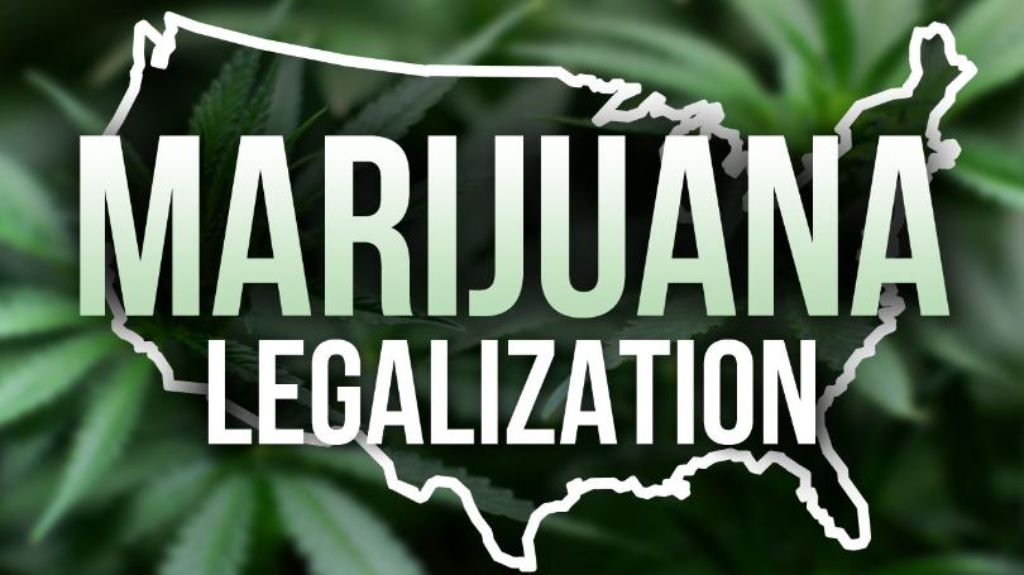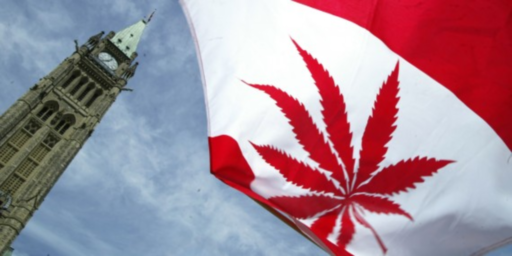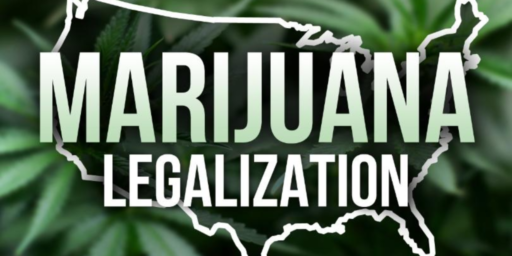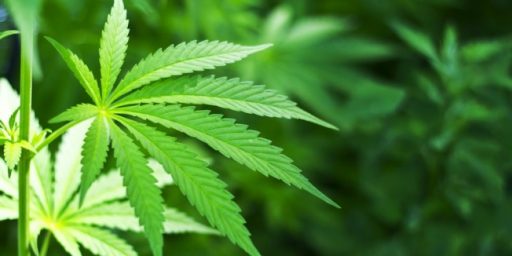Illinois Set To Become 11th State To Legalize Marijuana
Further progress for advocates of marijuana legalization from the Land of Lincoln.

Late last week, the Illinois legislature gave final approval to a bill to legalize recreational marijuana in the Land of Lincoln, making the state the 11th in the country to make marijuana legal for any purpose:
Ilinois is one signature away from joining the 10 other states that have legalized recreational use of marijuana.
With a bipartisan vote of 66-47, the House approved a bill Friday that had been passed by the Senate Wednesday. Gov. J.B. Pritzker, who campaigned for office on a promise to legalize pot, almost immediately issued a statement in which he promised to sign a bill that he said offers “the most equity-centric approach in the nation.”
“This will have a transformational impact on our state, creating opportunity in the communities that need it most and giving so many a second chance,” Pritzker said in his statement.
With the governor’s signature, Illinois would become the first state to create a commercial recreational marijuana industry through the legislature rather than by voter initiative.
Supporters hailed the measure as an acknowledgement that the prohibition of marijuana has failed, and they argued that the bill will begin to address decades of racial disparities in the prosecution of drug crimes.
“Prohibition hasn’t built communities. In fact, it has destroyed them,” said Rep. Kelly Cassidy, D-Chicago, who worked with Chicago Democratic Sen. Heather Steans for more than two years to craft the bill. “It is time to hit the reset button on the war on drugs.”
The bill takes effect Jan. 1 and would allow residents age 21 and older to legally possess 30 grams of cannabis, 5 grams of cannabis concentrate or 500 milligrams of THC contained in a cannabis-infused product. Nonresidents could possess 15 grams of cannabis.
It would also create a licensed cultivation and dispensary system while directing Pritzker to pardon people with past convictions for low-level pot possession.
Rep. Jehan Gordon-Booth, a Peoria Democrat, said the discussion about the bill’s expungement provisions was the first time in her decade as a lawmaker that minority communities were at the center of a major policy decision.
Wiping people’s criminal records clean will open up new educational and career opportunities that will help lift people out of poverty, Gordon-Booth said.
“If you are wearing the scarlet letter of a conviction, you are now calcified in poverty because of a mistake,” she said. “Not even a mistake, a choice.”
(…)
Legalizing marijuana is expected to generate $57 million in general revenue in the coming budget year and $30 million for a cannabis business development fund. That’s far less than the $170 million Pritzker projected in his spending plan, but budget negotiators have said they aren’t counting on any of that revenue.
After paying for regulatory expenses and costs related to the expungement process, marijuana revenue would be divided among a number of areas. The largest share, 35%, would go into the state’s general fund; 25% would go to community grants; 20% to mental health and substance abuse programs; 10% to pay down the state’s backlog of unpaid bills; 8% to support law enforcement; and 2% for public education.
All of this comes in the face of recent developments that show the extent to which marijuana legalization is becoming more and more of a mainstream position across the political and demographic spectrum. Most recently, this was shown in polls from Gallup, Pew Research Center, and Quinnipiac which all showed support for legalization continues to grow. The Gallup poll was perhaps the most remarkable of the three in that it showed support for legalization across all of the major demographic groups, including political affiliation. In that poll, the strongest support was unsurprisingly from Democrats (75% favor legalization) and Independents (71% support legalization) but even self-identified Republicans, which had been among the final demographic groups where majority support did not exist, showing 54% of that group supported legalizing marijuana for recreational use. Additionally, support for legalization among Americans 55 and older, another group that has been late to the legalization movement, was up to 59%.
These polls were the latest milestone in a trend that began at the beginning of the decade, has continued unimpeded for the past seven years, and which shows no signs of stopping or reversing itself any time soon. In 2011, for example, polling showed that support legalization had reached the 50% level, while even larger numbers supported legalization for medical purposes or decriminalization. By 2013, the number of Americans supporting legalization had passed the 50% mark. That mark reached 55% in 2014 and 58% in 2015. By this time last year, polling showed that support for legalization had reached 64% and a poll taken five months ago showed support at 63%. So, we’ve basically reached the point where two-thirds of the American public supports complete legalization and, according to the most recent polling, upwards of 90% of Americans support the legalization of marijuana at least for medical purposes.
As these poll numbers have increased, the movement toward liberalization of marijuana laws and outright legalization has moved steadily forward. It began to gain steam, of course, in 2010 when Colorado and Washington both passed citizen referenda legalizing cannabis. Four years later similar measures passed in Oregon, Alaska, and the District of Columbia. Delaware joined the trend in 2015 when the Governor signed a bill to decriminalize marijuana, make possession of cannabis a civil penalty with no more than a $100 fine. In 2016, voters in California, Massachusetts, Nevada, and Maine approved referenda legalizing marijuana while voters in a number of other states approved legalization for medicinal purposes. ‘
2018 was, if anything, one of the best years for the legalization movement so far. January of that year, for example, was arguably the biggest month ever for the movement given the fact that the most populated state in the nation, California, officially legalized marijuana based on the aforementioned 2016 referendum. Additionally, Vermont became the first state to legalize marijuana through the legislature instead of a voter referendum. Finally, on Election Day 2018, voters in Michigan approved legalization for recreational use and voters in Utah approved legalization for medical purposes. Unfortunately, though, a measure to legalize marijuana for recreational use failed in North Dakota.
There have also been efforts to legalize marijuana in New York and New Jersey, although both efforts have been bogged down due mainly to infighting among Democratic legislators in both states. In the Garden State specifically, this likely means that voters will be voting on a legalization referendum on Election Day in 2020. New Yorkers, meanwhile, will have to wait for next year’s legislative session to revive the push for legalization. On the whole, though, the legalization movement continues to advance, as this news out of Illinois shows us.
There has also been some progress on the Federal level. As I noted back in March, legalization has become a consensus issue among the candidates for the Democratic nomination. Additionally, Congress could take legislative action on this issue with legislation directing that marijuana be removed from the list of Schedule I drugs, a list that also includes “hard” drugs like LSD and heroin. Unfortunately, Congressional action on legalization is unlikely at this point, at least in the Republican-controlled Senate.
This isn’t the only area in which Federal action can have an impact, though. There is also the issue of Justice Department policy regarding enforcement of the law in states where marijuana has been legalized. Under the Obama Administration, the position adopted by the Justice Department after states began legalizing marijuana for both medical and recreational use was that Federal authorities would not aggressively enforce Federal law in those states other than to address issues involving interstate drug trafficking. After President Trump was elected, Attorney General Jeff Sessions reversed those guidelines and essentially left it to individual United States Attorneys to decide how to prioritize such cases. While there has been no indication of a Federal crackdown in the states where legalization has taken place, this puts residents in jeopardy of being prosecuted by Federal authorities even though they are engaging in activity that is entirely legal under state law.
Presumably, a future Democratic President would return to the Obama era policy and, potentially, they could follow through on the calls made by many experts to remove marijuana from the list of Schedule One drugs. Until that happens, though, millions of Americans remain under threat of Federal prosecution even though they are obeying the laws of the state they live in.






Marijuana consumers deserve and demand equal rights and protections under our laws that are currently afforded to the drinkers of far more dangerous and deadly, yet perfectly legal, widely accepted, endlessly advertised and even glorified as an All-American pastime, alcohol.
Plain and simple!
Legalize Nationwide!
It’s time for us, the majority of The People to take back control of our national marijuana policy. By voting OUT of office any and all politicians who very publicly and vocally admit to having an anti-marijuana, prohibitionist agenda! Time to vote’em all OUT of office. Period. Plain and simple.
Politicians who continue to demonize Marijuana, Corrupt Law Enforcement Officials who prefer to ruin peoples lives over Marijuana possession rather than solve real crimes who fund their departments toys and salaries with monies acquired through Marijuana home raids, seizures and forfeitures, and so-called “Addiction Specialists” who make their income off of the judicial misfortunes of our citizens who choose marijuana, – Your actions go against The Will of The People and Your Days In Office Are Numbered! Find new careers before you don’t have one.
The People have spoken! Get on-board with Marijuana Legalization Nationwide, or be left behind and find new careers. Your choice.
A minor point, but cocaine is in Schedule II. In fact, it’s used in the operating room for several ophthalmologic procedures. I’ve had it administered to me twice (one procedure for each eye). Heroin also has medical uses, but none are accepted by the FDA. In most of the world, it’s used for relief of very severe pain in, for example, terminally-ill cancer patients.
Last street weed I bought here in Sleepytown was $50 for 1/8 oz. Which, if my math skills are sharp and not blunt, works out to $400 an oz. A far cry from the $20 I paid for the first
1 oz. lid of Rantoul Rag I bought here some 50 years ago.
Of course I had to roll a fat reefer and choke the whole thing down to get a decent buzz in those days.
Todays grass is far more potent so a few hits can do the trick.
Not too long ago I would run to Colorado and pick up a bag for $100-$125/oz. Even with motel and gas expense that was cheaper than the local smoke.
But gas has gone up and quite frankly I-70 between Denver and Saint Louis lost it’s charm after I hitchhiked that run back in the summer of 1970.
Medical marijuana has been legal here in the Prairie State for several years and every time I drive past The Harbory I think about stopping in to see what’s up but just haven’t done that yet. I do get a chuckle though since that’s the same building that once housed the Illinois Department of Employment Security where I signed up for Unemployment Insurance Benefits.
Maybe they will start selling recreational pot when they can soon.
I hope the price is right.
@Electroman:
Thanks. I’ve assumed (without checking) that cocaine was on Schedule I. The fact that it isn’t but marijuana is makes classifying marijuana as a Schedule I drug even more absurd.
….one way of getting some money paid towards our state’s horrible deficit.
….and given how a lot of people drive around here anyway, I’m not sure that being doped up on a doobie wouldn’t solve some of the traffic problems. Doubt it would make matters worse!
We could be surprised, “United States Senators Elizabeth Warren (D-Mass.) and Cory Gardner (R-Colo.) today, April 4, reintroduced the Strengthening the Tenth Amendment Through Entrusting States Act (STATES Act) to ensure that each State has the right to determine for itself the best approach to marijuana within its borders.
U.S. Representatives Earl Blumenauer (D-Ore.) and David Joyce (R-Ohio) have reintroduced the bill in the House. ”
The Association of States’ Treasurers has banking for the MJ industry as one of their top priorities. But who knows if this will get out of committee.
@Electroman: Yeah it’s called Diamorphine. It has fewer side effects than morphine and is used as a replacement.
@Mister Bluster:
Here in CA, my dispensary sells $3 “OG Joints” and $5 “OG Blunts”, Indica or Sativa. You need two hits of the Indica to put your ass to sleep after about a 10 min high, and two hits of the Sativa to give you a three-four hour high if that’s your fancy. I use Indica exclusively about three times a week to help me sleep. Much better for me, and cheaper than Ambien. One joint lasts me two-three weeks.
It’s idiotic that it’s not legal in more places already. Eventually, it will be legal in 45 states, with Alabama, Mississippi, Kentucky, West Virginia, and Utah being the lone holdouts. Although the Mormons love their porn, so perhaps they won’t mind weed.
@EddieInCA:
IIRC, before the rash production legalization in the last few years, Kentucky wasthe second or third largest domestic of producer of [illicit] cannabis. Even if they’ve been pushed down the ranks a bit, the bourbon state has to be up there. The draw of a ready made tax break is gonna be too strong to ignore, sooner than later. I think KY will be one of the first deep red States to legalize.
Do you all live in houses or apartments?
I’ve lived in three high end non-smoking apartment buildings here in CA in the last three years. They all smell like pot. The halls. The elevators. It sneaks through the walls and under the doors into my unit. As a nonsmoker it’s a bummer.
First weed I bought in California was when I was living in San Francisco in 1974. Couldn’t have cost much as my income was limited to what I was making as a personal care attendant to my quadriplegic friend Joe.
Typical smoke of the day. Take a deep toke and hold it in as long as you could for a decent high.
At least it was real weed as opposed to the one ounce bag of oregano my brother brought home that he had copped at Union Square when he was visiting us in Bernal Heights.
His name is Pete but we called him Herb till he left town just to piss him off.
@EddieInCA:
Actually Utah just legalized medical MJ – so way ahead of the other states you listed.
The losers in legalization? The black market folks (like Mendocino County growers, and the gangs).
@Richard Gardner:
Thrilled to be wrong. Thanks for the update.
@Qtip:..bummer..
I live in an old trailer house that’s paid for on a 1/2 acre of land that I own out in the country. Closest neighbors are at least 300′ away.
Been tobacco free for 20 years after choking on the butts for longer than I care to remember so I can relate to your dilemma somewhat.
I do remember years ago visiting college friends at their parents homes and burning incense in the bedroom and putting wet towels at the bottom of the doors while we toked so mom and dad would not smell the weed.
Never got busted so I guess that worked.
Not like you should have to do it and maybe you have tried this already.
The Best Air Freshener for Weed: Mask Cannabis Odor With These Sprays
@Mister Bluster: We (my friends) had a nearly perfect technique for smoking in a room and getting away with it (when I was 20 years younger). If you take some dryer sheets stuff them into a cardboard tube like a toilet paper or paper towel roll and then exhale through said tube you’ll eliminate most if not all the smell. Some of the stinkier stuff will still smell up the place but it’ll be a fraction of what openly smoking would produce. Also make sure to snuff the bowl between puffs. IT’s kind of funny because the room will smell more like a dryer was run in that room than anything else. It’s kind of amazing how effective it is.
Joints blunts spliffs whatever are going to need a spray like you linked.